- Регистрация
- 21.07.20
- Сообщения
- 40.408
- Реакции
- 1
- Репутация
- 0
SingularityNET, the AI company behind the expressive robot Sophia, is “seriously discussing” a migration from Ethereum to Cardano, after announcing a collaboration with IOHK.
IOHK is run by the founder of Cardano, Charles Hoskinson, and drives the development of the blockchain platform.
SingularityNET is a full-stack AI platform that lets anyone create, share, and monetize AI services at scale. The potential move to Ethereum is driven by concerns around speed and costs that have been badly affected lately by demand from DeFi platforms, with gas cost peaking as high as $17 per transaction. The team also has doubts about the feasibility of Ethereum 2, which has been in development for the past few years but is still some way off being a practical solution.
“Current speed and cost issues with the Ethereum blockchain have increased the urgency of exploring alternatives for SingluarityNET’s blockchain underpinning,” said Dr. Ben Goertzel, CEO and Founder of the SingularityNET Foundation. He said the partnership will help drive Caradano's development and scale SingularityNET-based services:
If SingularityNET goes ahead with the plan, it would swap its native AGI token from ERC20 to Cardano and completely ditch the Solidity programming language in favor of Plutus to create smart contracts. Dr. Goertzel took a swipe at Solidity's shortcomings saying:
Dr. Goertzel believes the future is multi-chain, so there’s a good chance the team may not move away from Ethereum completely. In an interview with IOHK’s Charles Hoskinson he said that being a decentralized project it was up to the community and market to decide:
“If the Cardano portion works much much better.. then everything should migrate there," he said. "If it turns out that the Ethereum portion is more useful for some purposes, the Cardano portion is useful for some purposes, then so be it, right?”
SingularityNET has a big vision for the future, with one of the important aspects something called Artificial General Intelligence (AGI) — a hypothetical machine intelligence that has the capacity to understand or learn any intellectual task that a human being can.
The network aims to create an ecosystem where a variety of different AIs can collaborate and outsource tasks to other AIs. For Dr. Goertzel, diversification and decentralization of AI is very important since most AI projects are owned by large tech companies. He hopes that Cardano will accelerate this process:
SingularityNET claims to be the first platform to allow different AIs to communicate with each other and share data while connecting developers and users. The company is also behind the most sophisticated and expressive robot to date, Sophia, and have applied for citizenship for the robot with the Maltese government.
IOHK is run by the founder of Cardano, Charles Hoskinson, and drives the development of the blockchain platform.
SingularityNET is a full-stack AI platform that lets anyone create, share, and monetize AI services at scale. The potential move to Ethereum is driven by concerns around speed and costs that have been badly affected lately by demand from DeFi platforms, with gas cost peaking as high as $17 per transaction. The team also has doubts about the feasibility of Ethereum 2, which has been in development for the past few years but is still some way off being a practical solution.
“Current speed and cost issues with the Ethereum blockchain have increased the urgency of exploring alternatives for SingluarityNET’s blockchain underpinning,” said Dr. Ben Goertzel, CEO and Founder of the SingularityNET Foundation. He said the partnership will help drive Caradano's development and scale SingularityNET-based services:
“The transition of SingularityNET onto modern blockchains such as Cardano is a clear route to achieving scale and speed, and the completion of the fiat-to-crypto gateway will remove the requirement for end-users of SingularityNET-based services to deal with cryptocurrency infrastructure”
If SingularityNET goes ahead with the plan, it would swap its native AGI token from ERC20 to Cardano and completely ditch the Solidity programming language in favor of Plutus to create smart contracts. Dr. Goertzel took a swipe at Solidity's shortcomings saying:
“As a Turing-complete language without simple dedicated mechanisms for creating more limited Domain-Specific Languages (DSLs), Solidity presents significant challenges to the formal program verification and the analysis methods that are critical to safety and security on today’s Internet.”
Dr. Goertzel believes the future is multi-chain, so there’s a good chance the team may not move away from Ethereum completely. In an interview with IOHK’s Charles Hoskinson he said that being a decentralized project it was up to the community and market to decide:
“If the Cardano portion works much much better.. then everything should migrate there," he said. "If it turns out that the Ethereum portion is more useful for some purposes, the Cardano portion is useful for some purposes, then so be it, right?”
SingularityNET has a big vision for the future, with one of the important aspects something called Artificial General Intelligence (AGI) — a hypothetical machine intelligence that has the capacity to understand or learn any intellectual task that a human being can.
The network aims to create an ecosystem where a variety of different AIs can collaborate and outsource tasks to other AIs. For Dr. Goertzel, diversification and decentralization of AI is very important since most AI projects are owned by large tech companies. He hopes that Cardano will accelerate this process:
“Cardano’s thoroughly formalized functional programming foundations have potential to provide a rich and flexible basis for implementing advanced aspects of the SingularityNET design — but just as critically, they have strong promise to provide a secure and reliable basis for the network’s operations basic and advanced alike.”
SingularityNET claims to be the first platform to allow different AIs to communicate with each other and share data while connecting developers and users. The company is also behind the most sophisticated and expressive robot to date, Sophia, and have applied for citizenship for the robot with the Maltese government.

